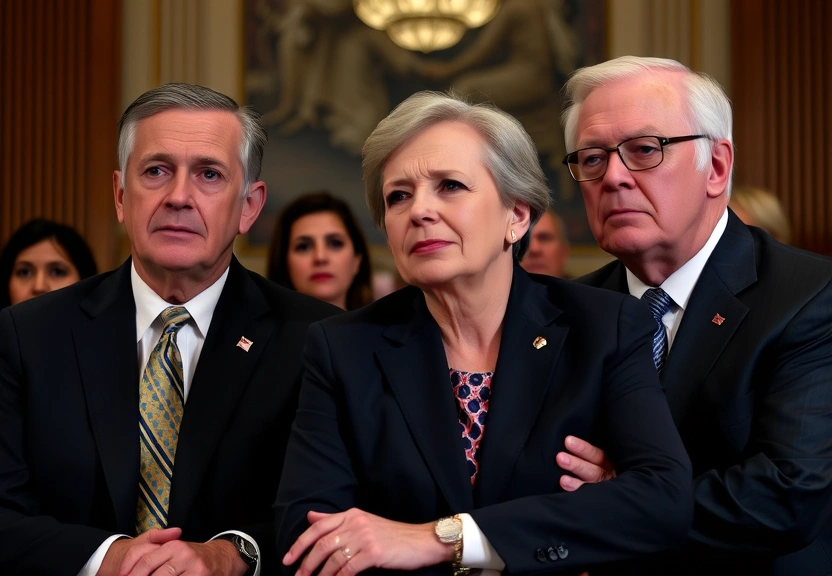Senators Demand Accountability from Cantor Fitzgerald Amid Tariff Conflict Concerns
In the realm of finance and politics, few issues have stirred as much debate as the impact of tariffs implemented during the Trump administration. As the nation grapples with the ramifications of these policies, a new controversy has emerged surrounding Cantor Fitzgerald, a prominent financial services firm. Senators Ron Wyden and Elizabeth Warren have raised significant concerns about the firm’s recent actions, which reportedly include creating mechanisms for clients to bet on the viability of Trump’s tariffs in court. This article delves into the details of the senators’ demands for accountability, the implications of such financial maneuvers, and the broader context of tariffs in the U.S. economy.

The backdrop for this situation is marked by the contentious trade policies initiated by former President Trump, which have led to an ongoing series of legal challenges. With tariffs imposed on various goods, the stakes are high for businesses, consumers, and investors alike. Cantor Fitzgerald’s alleged involvement in facilitating bets on the legal outcomes of these tariffs raises ethical questions about the intersection of finance and public policy. As the senators push for clarity and accountability, the narrative surrounding Cantor Fitzgerald continues to evolve.
The Role of Cantor Fitzgerald in the Tariff Landscape
Founded in 1945, Cantor Fitzgerald has established itself as a significant player in the financial services industry, offering a range of services from investment banking to trading. However, recent reports indicate that the firm has ventured into more controversial territory by creating financial products that allow clients to speculate on the potential overturning of Trump’s tariffs. This move has ignited a firestorm of criticism, particularly from lawmakers who view it as an exploitation of a sensitive political issue.
Understanding the Allegations
The allegations against Cantor Fitzgerald suggest that the firm has developed financial instruments that effectively enable clients to wager on the outcome of ongoing legal battles concerning tariffs. This has raised eyebrows among senators who are concerned about the ethical implications of profiting from a situation that affects millions of Americans. By allowing clients to bet on the fate of tariffs, Cantor Fitzgerald may be perceived as undermining the seriousness of the legal processes involved.
Senators Wyden and Warren’s Call for Accountability
Senators Ron Wyden and Elizabeth Warren have taken a firm stance on the issue, demanding transparency and accountability from Cantor Fitzgerald. In their public statements, they have expressed their concerns regarding the potential consequences of financial speculation on tariffs, which could lead to further economic instability. The senators have a history of advocating for consumer protection and corporate accountability, making their involvement in this matter particularly noteworthy.
The Senators’ Demands
- Clarification of Financial Products: The senators are calling for detailed information regarding the types of financial instruments Cantor Fitzgerald has created and how they function.
- Impact Assessment: They are requesting an analysis of how such financial products could affect both the market and the broader economy.
- Ethical Review: The senators are urging for an ethical review of the firm’s practices, emphasizing the need for responsible conduct in the financial sector.
The Broader Implications of Tariffs and Financial Speculation
The controversy surrounding Cantor Fitzgerald is not merely about the firm itself; it reflects a larger debate regarding the role of tariffs in the U.S. economy and the ethical responsibilities of financial institutions. Tariffs, which are taxes imposed on imported goods, have far-reaching effects on trade relationships, consumer prices, and domestic industries. As such, any financial speculation surrounding them can amplify the uncertainty and volatility in these areas.
Economic Consequences of Tariffs
Tariffs were a cornerstone of Trump’s economic policy, aimed at protecting American manufacturing and addressing trade imbalances. However, they have also led to increased costs for consumers and retaliation from trading partners, sparking ongoing legal challenges. Speculative financial products related to tariffs can further complicate this landscape by introducing additional layers of risk for businesses and investors.
Public Reaction and Media Coverage
The response to the allegations against Cantor Fitzgerald has been swift, with media outlets covering the story extensively. Public opinion is divided, as some view the firm’s actions as an innovative financial strategy, while others see it as a troubling sign of the commodification of political issues. The involvement of high-profile senators has added weight to the conversation, prompting discussions about regulatory oversight in the financial sector.
Media Perspective
Publications like WIRED have highlighted the intricacies of the situation, emphasizing the ethical dilemmas posed by financial speculation on tariffs. The discourse surrounding Cantor Fitzgerald serves as a case study in the broader implications of financial practices intersecting with public policy. Analysts and commentators are weighing in, debating whether such speculation should be curtailed or whether it represents a legitimate aspect of market behavior.
Frequently Asked Questions (FAQ)
1. What are tariffs and why are they imposed?
Tariffs are taxes levied on imported goods to protect domestic industries, raise government revenue, or influence trade policies. They are often used as a tool in trade negotiations and can significantly impact market dynamics.
2. What is Cantor Fitzgerald’s role in the financial market?
Cantor Fitzgerald is a global financial services firm that provides a range of services, including investment banking, trading, and market-making. It has a significant presence in various financial markets.
3. Why are Senators Wyden and Warren concerned about Cantor Fitzgerald?
The senators are concerned that Cantor Fitzgerald’s creation of financial products related to tariffs represents an unethical exploitation of a politically sensitive issue that affects many Americans.
4. What could be the economic impact of financial speculation on tariffs?
Financial speculation can exacerbate market volatility, create uncertainty for businesses and consumers, and lead to unintended economic consequences, such as inflation or job losses in affected industries.
5. What actions can be taken to ensure accountability in the financial sector?
Regulatory oversight, ethical guidelines, and transparency measures can help ensure that financial institutions operate responsibly and do not exploit sensitive political issues for profit.
Conclusion
The demands for accountability from Cantor Fitzgerald by Senators Ron Wyden and Elizabeth Warren underscore the complex interplay between finance and politics in the context of tariffs. As the legal battles surrounding these tariffs continue, the actions of financial firms like Cantor Fitzgerald will be closely scrutinized. The implications of allowing clients to speculate on such critical issues raise ethical questions that merit serious consideration. Moving forward, it is essential for financial institutions to operate transparently and responsibly, recognizing their impact on the broader economy and society. The ongoing dialogue about tariffs and financial speculation will undoubtedly continue to shape both public policy and market behavior in the years to come.
📰 Original Source
Este artigo foi baseado em informações de: https://www.wired.com/story/senators-probe-cantor-fitzgerald-tariffs/



